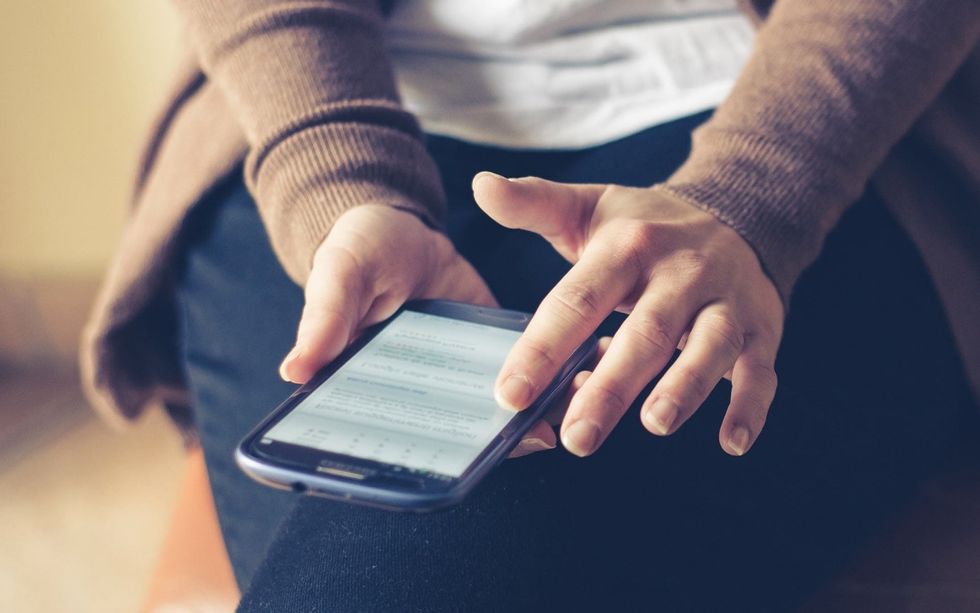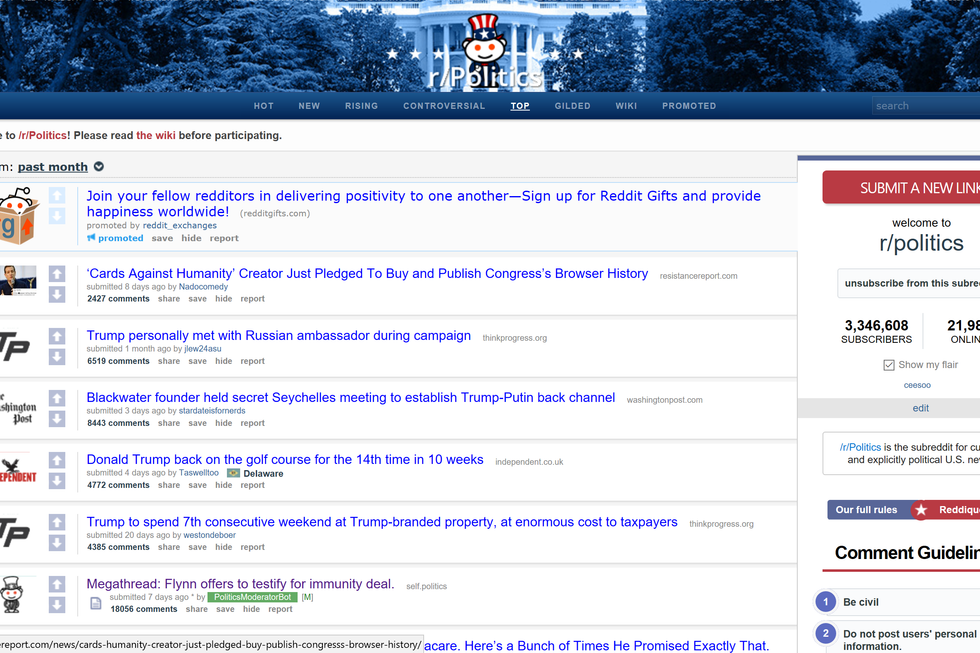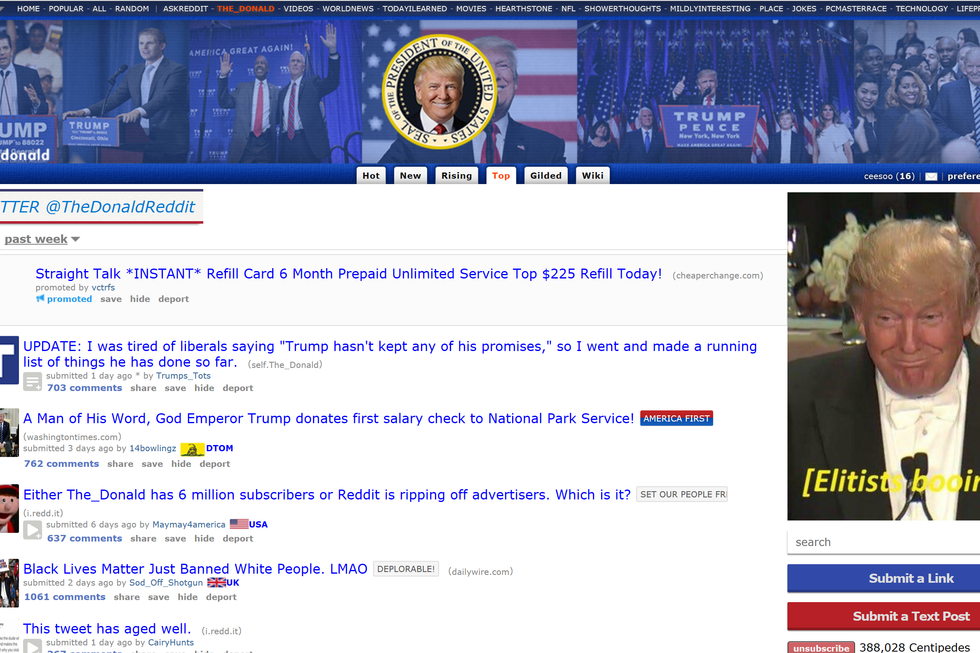The world is full of heavy users of social media these days. Social media websites such as Facebook, Twitter and Google have billions of people who use them every day, and it’s rapidly growing. They use social media to connect with current and old friends, share videos of funny things their cats do and catch up on the news. One thing that a lot of my family and friends like to do is share things that they are interested in or feels like it is important, such as stories and news articles. Recently social media has been full of stories and opinions about the recent 2016 election and social justice movements such as LGBTQ rights, feminism, racism and religious practices. Topics like these have made great strides in recent years, but they still face social injustice. Politics dictates a lot of these topics, and it has gotten to the point where politics cannot be separated from social injustice because they have so much influence on them. Social media has changed the way we receive news about issues with social justice, and may even encourage injustice.
There’s no doubt that there are positives of what social media does for social injustice. Shaun King in Social Media and Social Justice Go Hand in Hand describes social media as “a tool that allows compassionate women and men to share their stories that force them onto international headlines." For example, someone who sees something in his or her neighborhood that he or she feels is important can post it onto a social media website like Facebook. The friends of that person view it and share it with their followers, and it continues to gain traction until picked up by a newspaper or news reporter. Once it reaches this stage, millions of people have the potential of seeing it. This was the case of the killing of the unarmed teenager Michael Brown in Ferguson, Missouri. Before the incident, nobody had ever heard of Ferguson or even knew where it was. The footage spread like wildfire and created a huge social movement on racism and police brutality.
In addition to this, social media allows information to spread around the globe in a matter of seconds. A couple decades ago, you would have to wait for the news at night to hear about stories that happened during the day or read the newspaper the following today. For example, same-sex marriage became legal in the United States a couple years ago. When it was put into law, social media outlets had the news out on their platforms within a couple minutes; nearly half an hour before any television or mainstream media according to Deana Rohlinger. The news traveled around the world and invaded businesses, schools and the homes of millions. I first saw this show up on my Twitter timeline within a couple minutes of social media picking up on it. Social media allows news to get to the world faster than ever before. We can see that social media does positive things for social injustice. Or does it?
While social media can raise awareness on certain social justice issues, it may not always promote it in a positive way. Social media can actually contribute to the growing issues of social injustice. William Jasper states there was outrage on social media about President Trump’s Muslim Ban, an executive order that for 90 days would prohibit the entry of foreign nationals into the United States from seven countries. Like any political issue, there were people for this and people who were against this. People in favor said it was keeping the country safer for a brief time, while opponents of this argued that it was not a travel ban for safety and more of a religious ban against Muslims. President Trump has also been working on another one of his campaign promises; to build a wall between the United States and Mexico to prevent illegal immigrants from coming into our country. People in favor of this said it was bringing back jobs to Americans and keeping illegal immigrants out. Opponents say it is an expensive idea that will damage our relationship with Mexico and won’t solve anything, if yet create problems. These topic have led to arguments and stories that talk about racism and can promote racism against minorities on social media.
But to understand how social injustice is spread across social media, one has to look at the science behind it; that is the connection between social media and social injustice. During the 2016 election, Russian hackers posted an email from Hillary Clinton that claimed to be rigging the polls in Clinton’s favor. Looking further into the email, Timothy Lee says it was a tactic called oversampling that was collecting extra data about a particular group. Despite this, opponents of Clinton would scroll through social media and see this story and make assumptions that it was actually being rigged. What they wouldn’t notice is that the email was from 2008 and not 2016. This entire situation doesn’t only apply to Republicans though, as something similar could happen to liberal audiences.
Earlier this year, Trump’s executive order banned seven predominantly Muslim nations from entering the United States was shot down by a federal judge, and it resulted in disjointed racist panic, according to Adam Johnson. It was easy to point fingers at Trump and call him a straight up racist on this executive order. Whether you agree that he is or he isn’t, Islamophobia coverage isn’t the fault of him, but of corporate and social media propaganda that laid the groundwork. Terrorism and the Islamophobia industry has been brought to attention by websites such as Breitbart, Infowars and CNN . When they talk about the “war on terror” they are labeling terrorism as a unique threat that only applies to Muslim violence. Johnson talks about talk show hosts that like Bill Maher like to talk about the democratic party and jab at Republicans, but he is very pro-war and has said numerous bigoted statements about Muslims. He is someone who uses the pretense of reason and liberal enlightenment to advance conventional wisdom about American and Israeli aggression in the Middle East. How media outlets cover the activity of terrorism changes the “war on terror” as well. When they report on stories about the war on terror, social media websites and their users will fabricate and exaggerate the horrors of what organizations like ISIS will do.
What makes social media so dangerous for news and social injustice is the filter bubbles it puts on people’s timelines and feeds. On social media, people can choose who and what to follow to their liking. Because of this, they may be exposed to a biased view about certain issues or any form of social injustice. As history and Timothy Lee shows us, Republicans will convince themselves that Democrats pose a mortal threat to our democracy and vice versa. Hypothetically, if someone is a liberal, they will be keen to following and reading stories on social media that pertain to democratic policy. They may read a report on a story that attacks the Republican party and only talks about the bad things they do. They may leave out a detail or two that goes against their argument and can completely alter your view on the subject.
An example of this is not Republicans versus Democrats, but rather found within the political left. Last election, the democratic party was split between two candidates, Hillary Clinton and Bernie Sanders. A lot of Bernie Sanders supporters were guilty of these filter bubbles on a popular website called Reddit. Reddit is a social media website where users vote about stories and content to the front page from pages called subreddits that focus on certain topics, from gaming discussion to world news. They have a politics subreddit, and it is dominated by Bernie Sanders supporters. If someone relied on Reddit to receive their news every day, they would only see news stories that praised Bernie Sanders and criticized Republican candidates and even Hillary Clinton. People who rely on Reddit for their news wound up living in their own factual universe. The readers have a hard time separating what is a fact versus what is fiction, and it creates misconceptions. When Bernie lost the democratic election, there was a lot of outrage on Reddit saying that it was rigged in Clinton’s favor. The true statement is that Hilary Clinton simply had more supporters, but you wouldn’t see that if you got your news from Reddit.
There is another subreddit on Reddit that is full of Donald Trump supporters. Like the politics subreddit, this one praises Trump and criticizes anything that relates to the Democratic party. Within both of these subreddits, topics about social justice are quite common because they are heavily influenced by politics. One side may be for a certain social justice issue and will only talk about the positive things about it while not discussing the negatives. The other side will criticize it and talk about their opinions on social injustice and why their view is the correct one.
The concept of filter bubbles do not just apply to social websites like Reddit; they also apply to some of the most popular social media websites such as Facebook. Taking data from their users, Facebook and other juggernaut social sites sell your information to other companies and put things on your timeline that you find interesting. If someone reads a lot of news from Breitbart and other stories that lean to the right, similar stories will appear on the timeline as well. Friends who share common interests will share similar stories and content. All of this happens because the user gets to make the decision of who to follow and who not to follow. They are exposed to one side of the story, hence why filter bubbles are dangerous.
So how do we fight this? To prevent filters bubbles, there are actions that users can take. One way is to read news from websites that aren’t very biased or don't lean heavily toward one end of the political spectrum. Good sources for these include the Associated Press and Reuters. Well researched pieces of journalism allow a reader to understand all sides, their issues, their strengths and their weaknesses. If receiving news from a website or timeline that a user knows might be biased, it is a good idea to research the story and read it from other websites to see how the facts and information line up. A skill to learn is how to separate the information from the bias in a story. Every news outlet, social media website and journalist is going to have a little bias and express their opinion. Learning how to take only the information given out of a story without being convinced by the author or news website can prevent one sided arguments.
Social justice movements are heavily influenced by social media and politics. It has positive and negative effects on social injustice. Many of these negative effects come from filter bubbles that social media is guilty of providing for its users. Learning how to distinguish bias in stories and reading well-made pieces of journalism can help prevent misconceptions shut down filter bubbles. All of these things can help contribute to the fight against social injustice.





















